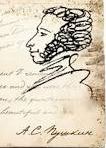At the end of the 18th century, a Russian poet by the name of Alexander Sergeyevich Pushkin was born in Moscow. The date was June 6th, 1799, and the newborn was to become the father and founder of modern Russian literature during a century considered to be the most important century in Russian literature. Pushkin was a member of the Russian nobility, and was so talented a poet that he published his first poem at the age of 15.
Pushkin’s major work was written between 1820 and 1830, and many of his poems and other writings are considered to be masterpieces by many critics around the world. Poems such as The Bronze Horseman, A magic moment I remember and Karamzi; drama work with The Stone Guest; a verse novel by the name of Eugene Onegin; and, last but not least, narrative poems such as his first Ruslan and Lyudmil, and Bratya razboyniki [The Robber Brothers]. He in fact authored more than 130 poems between 1814 and 1817.
Pushkin liked to use note-books to document his work. This format of capturing thoughts facilitated not only a prolonged collection of poetry work, but also the preservation of the original manuscripts along with extracts for planned work describing a memorable occasion, or sketches of rough copies of important letters to be composed. Today, the Manuscript Department of the Pushkinsky Dom Institute in Petersburg holds collections of autographs and stores his personal funds (7,749 units of issue, 1,773 autographs).
In the year 1999, commemorating the 200th anniversary of Pushkin’s birth, the Petersburg Consortium published the facsimile edition of his rough note-books. Eight volumes include more than 2,000 reproductions of Pushkin’s hand written work. The edition was distributed to over 200 subscribers in the UK, America, Switzerland, Japan, Italy, and Norway. Another 100 complete sets were presented by Pushkinsky Dom to museums and universities, public and academic libraries of Russia, and the former Soviet republics. The Complete Working Notebooks of 8 volumes in Russian, 4to format, contain The Lyceum Working Notebook, Travel Notebooks, The Kishinev Working Notebooks, The Masonic Working Notebooks, Pushkin’s Last Working Notebook, Famous Sketches in Context, and Coded Marks and Secret Notes. The total release of 500 copies allowed Pushkin’s manuscripts to enter the study rooms of Pushkin scholars all over the world without the originals leaving the walls of the depository.
A copy of Pushkin’s narrative poem, Bratya razboyniki [The Robber Brothers], currently for sale on Abebooks happens to also be an association copy of Germany’s Field Marshal Wilhelm Keitel, and Soviet Marshal Georgy Zhukov – most senior military leaders during World War II. This unfinished narrative poem, written in 1822, had appeared in ‘Polaranya zvezda’ [Pole Star] for 1825; it was inspired by the Russian folk play ‘The Boat’. ‘The Boat is clearly a dramatic version of the songs celebrating the seventeenth-century outlaw Stepan Razin. This copy is priced at 47,500 USD, while other first edition copies of the same book are priced around $6000 and $5000.
During a trip to Moscow last year, I visited the Pushkin café. The restaurant, located near the Pushkin square, is promoted to be among the top 10 must visit attractions of the city. The café-restaurant is a five star establishment renovated to look like Pushkin’s home circa 1825.
I raised my eyes and you were there,
A fleeting vision, the quintessence
Of all that’s beautiful and rare
I pray to mute despair and anguish,
To vain the pursuits world esteems,
Long did I hear your soothing accents,
Long did your features haunt my dreams.
Time passed. A rebel storm-blast scattered
The reveries that once were mine
And I forgot your soothing accents,
Your features gracefully divine.
In dark days of enforced retirement
I gazed upon gray skies above
With no ideals to inspire me
No one to cry for, live for, love.
Then came a moment of renaissance,
I looked up – you again are there
A fleeting vision, the quintessence
Of all that’s beautiful and rare.
A magic moment I remember
by Alexander Sergeyevich Pushkin

{ 0 comments… add one now }